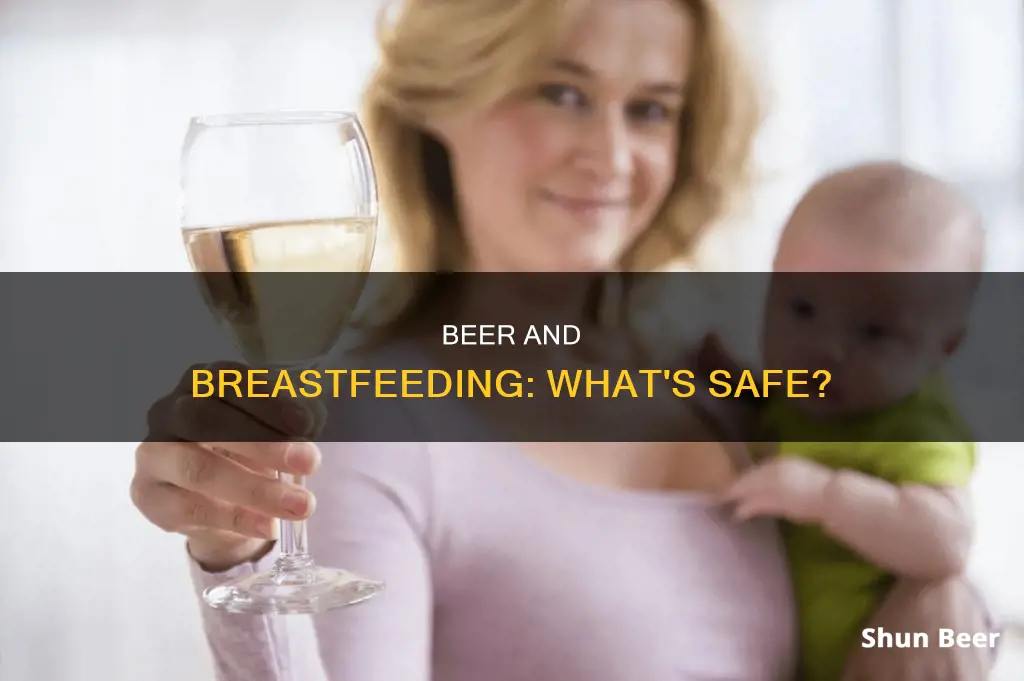
Drinking alcohol while breastfeeding is a topic that invites conflicting advice. While it is widely known that alcohol consumption during pregnancy can harm an unborn child, the effects of alcohol on a breastfeeding baby are less clear.
It is important to note that alcohol passes freely and quickly from the mother's bloodstream into her milk. The concentration of alcohol in breast milk is similar to that in the mother's blood and peaks around 30 to 60 minutes after drinking. The more alcohol consumed, the longer it stays in the mother's bloodstream and milk.
While occasional light drinking while breastfeeding has not been shown to have adverse effects on babies, regular or heavy drinking may negatively impact the mother's milk supply, the baby's sleep, growth, and development. Excessive drinking by the mother can result in slow weight gain or failure to thrive in the infant.
To minimise the amount of alcohol that reaches the baby, breastfeeding mothers can consider nursing their babies right before having a drink and then waiting for a couple of hours before the next feed. Alternatively, they can express and store milk beforehand to use for the next feed.
| Characteristics | Values |
|---|---|
| Occasional drinking | Not harmful to the baby |
| Drinking more than 1-2 drinks per week | Not recommended |
| Waiting time after drinking alcohol | 2 hours or more |
| Pumping and dumping | Not necessary |
| Alcohol abuse | May result in slow weight gain or failure to thrive in the baby |
| Effects on the baby | Poor weight gain, disrupted sleep patterns, psychomotor skills delay, cognitive delay later in life |
| Effects on the mother | Reduced milk supply, impaired ability to safely care for the baby |
What You'll Learn

How much alcohol passes into breast milk?
The amount of alcohol that passes into breast milk depends on the mother's blood alcohol content (BAC). Alcohol passes freely from the mother's blood to her milk, with alcohol levels in breast milk closely resembling those in maternal blood.
According to studies, the amount of alcohol that a baby consumes through breast milk is estimated to be 5% to 6% of the weight-adjusted maternal dose. For example, if a 154-pound (70 kg) woman were to drink four standard-sized drinks and then breastfeed her baby when her BAC was at its highest, her baby could potentially develop a BAC of 0.005%.
It is important to note that newborns metabolise alcohol at about half the rate of adults, so the alcohol they consume from breast milk stays in their body for longer. Therefore, it is recommended that mothers wait at least 2 hours after drinking before breastfeeding to minimise the concentration of alcohol in the breast milk. The length of time alcohol can be detected in breast milk also increases with the amount of alcohol consumed. For instance, alcohol from one drink can typically be detected in breast milk for about 2 to 3 hours, while alcohol from three drinks can be detected for about 6 to 8 hours.
Pensacola Beach's Beer Laws: Drinking Scenarios Explained
You may want to see also

Can alcohol affect milk supply?
Alcohol can indeed affect milk supply.
Firstly, it is important to note that the guidelines for drinking alcohol while breastfeeding are not as strict as during pregnancy, where no amount of alcohol is considered safe. However, the effects of long-term exposure to alcohol through breast milk are not yet fully understood.
According to the American Academy of Pediatrics, alcohol intake by a breastfeeding mother should be occasional and limited to no more than one drink per day. This is because alcohol can be detected in breast milk for about 2 to 3 hours after a single drink, and this duration increases with the amount of alcohol consumed. For example, two drinks can be detected for about 4 to 5 hours, and three drinks for about 6 to 8 hours.
Alcohol inhibits the milk ejection reflex, which decreases the amount of milk accessible to the infant. It also disrupts the hormones affecting milk production, leading to a decreased supply. Studies have shown that babies may drink up to 20% less milk in the 3 to 4 hours after their mother has had a drink.
Additionally, alcohol consumption while breastfeeding can cause sleepiness, interrupted sleep patterns, delayed development, and lower weight gain in the baby. It can also negatively impact the baby's gross motor development and possibly long-term development of reasoning skills.
Therefore, while an occasional drink is not considered harmful, regular alcohol consumption can indeed affect milk supply and have other negative consequences on the baby's health and development.
Beer and Ceft: A Safe Mix?
You may want to see also

Do I need to pump and dump after drinking alcohol?
Pumping and dumping is a method where a mother pumps out breast milk and throws it away instead of feeding it to her baby. The method was developed to avoid feeding babies breast milk that contains traces of alcohol or drugs. However, it is not always necessary to pump and dump.
According to the CDC, "Expressing or pumping milk after drinking alcohol, and then discarding it ("pumping and dumping") does NOT reduce the amount of alcohol present in the mother's milk more quickly." Instead, as the blood alcohol level falls over time, the level of alcohol in breast milk will decrease too.
If you feel tipsy, it is recommended to wait until you feel sober before breastfeeding or sharing pumped milk with your baby. Alcohol levels in the bloodstream peak 30-60 minutes after ingestion.
If you are going out without your baby and do not have access to a safe place to store your pumped milk, you may want to consider pumping and dumping to relieve discomfort and maintain your milk supply.
It is generally recommended to wait for at least 2 hours after drinking one standard alcoholic drink before breastfeeding. However, it is important to note that the more you drink, the longer it takes for the alcohol to clear from your system.
If you need to breastfeed or pump within 2-3 hours of drinking alcohol, it is recommended to pump and dump. Remember that pumping does not get rid of the alcohol in breast milk any faster, and as long as there is alcohol in your blood, it will be present in your breast milk.
According to the American Academy of Pediatrics, alcohol intake by a breastfeeding mother should only be occasional and moderate. For a 130-lb woman, this is equivalent to 2 ounces of liquor, 8 ounces of wine, or two beers. The American Academy of Pediatrics further recommends waiting for 2 hours or more after drinking alcohol before breastfeeding.
The Centers for Disease Control and Prevention (CDC) states that "not drinking alcohol is the safest option for breastfeeding mothers. However, moderate alcohol consumption (up to 1 drink per day) is not known to be harmful to the infant."
It is important to note that drinking alcohol while breastfeeding may have an impact on your baby's sleep and milk intake. Daily consumption of more than one drink per day or excessive drinking by a breastfeeding mother may contribute to poor weight gain, disrupted sleep patterns, psychomotor skills delay, and possibly even cognitive delay later in life.
Low-Carb Beer and Keto: What's the Verdict?
You may want to see also

What are the effects of alcohol on the baby?
The effects of alcohol on a baby depend on the amount of alcohol consumed by the breastfeeding parent, and the time elapsed between drinking and nursing. Here are some of the possible effects on the baby:
Short-term effects
- Sleep disturbances: Exposure to alcohol in breast milk can lead to shorter sleep periods, more frequent wakefulness, and less total active and REM sleep. Studies have shown that infants breastfed by mothers who drank alcohol prior to nursing experienced sleep disturbances, with more fragmented sleep patterns and a decrease in total sleep duration by about 25% on average.
- Decreased milk intake: Alcohol inhibits the milk ejection reflex, reducing the baby's milk intake. Studies have shown that infants consumed approximately 20% less milk in the first 4 hours after maternal alcohol consumption.
- Agitation: Nursing within 1 hour before or after ingesting alcohol can cause infant agitation and poor sleep patterns.
Long-term effects
- Impaired cognitive development: A study found a connection between mothers who drank while breastfeeding and lower cognitive scores in their children when they were 6 to 7 years old. These children exhibited deficits in abstract reasoning skills.
- Delayed motor development: Regular exposure to alcohol in breast milk has been associated with lower scores on Psychomotor Development Index (PDI) tests, indicating a delay in motor development.
- Impaired immune function: Exposure to alcohol in breast milk may impair the infant's immune function.
Exploring Panama City Beach: Beer and Beachside Relaxation
You may want to see also

What are the effects of alcohol on the mother?
While the effects of alcohol on breastfed babies are well-documented, the impact on mothers who are breastfeeding is less clear. However, there is some evidence that alcohol can affect the mother's milk production and ejection.
Effects on Milk Production and Ejection
Alcohol inhibits the release of oxytocin, a hormone that plays a key role in the milk ejection reflex. This can lead to a delay in milk ejection, resulting in the baby consuming less milk. Research has shown that infants consumed approximately 20% less breast milk during the first four hours after their mothers consumed alcohol, despite spending a similar amount of time on the breast.
Other Potential Effects
- Delayed motor development: Alcohol consumption can interfere with the mother's natural reflexes, including the milk ejection reflex. This can impact the baby's motor development, as they may not be able to suck effectively, leading to decreased milk intake.
- Sleep: It is not recommended to co-sleep with your baby if you have been drinking, as alcohol impairs your natural reflexes. Additionally, drinking alcohol can disrupt your own sleep patterns, which may impact your ability to care for your baby.
- Weight gain: Regular alcohol consumption can negatively affect the mother's weight and, consequently, her overall health.
Pregnant Women and Root Beer: Is It Safe?
You may want to see also
Frequently asked questions
Most healthcare professionals agree that drinking small amounts of alcohol while breastfeeding is unlikely to harm your baby. However, opinions vary over the amount of alcohol that is considered safe. The American Academy of Pediatrics recommends that alcohol intake by a breastfeeding mother should be occasional and limited to no more than 0.5 g of alcohol per kg of body weight, which for a 60 kg mother is approximately two beers. It is also recommended that you wait at least two hours after drinking before breastfeeding your baby.
Alcohol passes freely and quickly from your bloodstream into your breast milk. The concentration of alcohol in your milk is similar to that in your blood and peaks about 30 to 60 minutes after drinking. The more you drink, the longer alcohol stays in your bloodstream and milk, and the higher the concentration becomes.
Studies have shown that babies may drink up to 20% less milk in the 3 to 4 hours after their mother has had an alcoholic drink. Alcohol can also disrupt sleeping patterns, with babies sleeping up to 25% less. Regular and heavy drinking while breastfeeding can affect milk supply, your baby's sleep, gross motor development, and possibly long-term development of reasoning skills.







